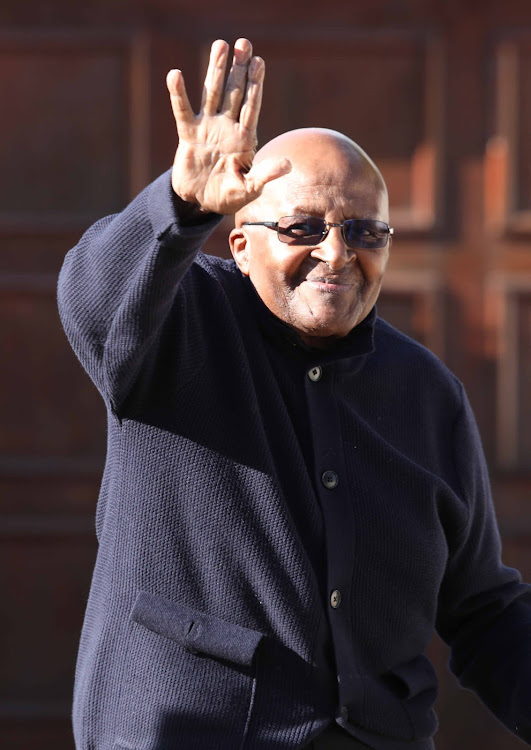An Ebony Magazine Opened His Eyes
Homepage photo: Archbishop Emeritus Desmond Tutu votes in Milnerton, Cape Town, in 2019. (Credit: Esa Alexander, Sunday Times, Cape Town, South Africa)
Support Journal-ismsTributes at a media briefing in South Africa on the passing of Archbishop Emeritus Desmond Tutu. (Credit: SABC News/YouTube)
An Ebony Magazine Opened His Eyes
Archbishop Emeritus Desmond Tutu, who died of cancer Sunday at 90, credited Ebony magazine with opening his eyes to the potential of Black people, fought for press freedom after South Africa won its independence, and headed the country’s Truth and Reconciliation Commission, held up by American editorialists and politicians as the kind of balm that might help salve racial wounds in the United States.
“You are a crazy country, I think, in very many ways,” the winner of the 1984 Nobel Peace Prize told Hugh Dellios and Storer H. Rowley, editors at the Chicago Tribune, in May 2008 as the half-African Barack Obama was poised to become the United States’ first Black president.
“You’re a country that has, I think, some of the most generous people I’ve ever come across in the world. [But] on the whole, you got very, very upset at [Obama’s pastor Rev.] Jeremiah Wright [Jr.]. Now, Jeremiah Wright may have said more crudely what, actually, almost every African-American would have wanted to say. I mean, that is how they feel in your country, that race is a very, very real issue.
“When I first came to this country in ’72, I was quite shaken by the intensity of feeling that African-Americans had. And I said I couldn’t understand: Why are they so bitter? Why are they so angry?
“There, in South Africa [under apartheid], they told you, ‘You’re nothing, and we’re going to treat you like the nothing you are. And don’t ever hope to think that you have a chance of being treated differently.’
“Here, you say to them, ‘You’re equal, and the sky’s the limit.’ And they keep bumping their heads against this thing that’s stopping them from reaching out to the stars. And so I understood that it was the illusion of equality, which is still the case.
“And yet, why I say you’re such a crazy country, you’ve got all of that going against you, and yet you produce [Obama]. Where else in the world would you ever have had anything like that?”
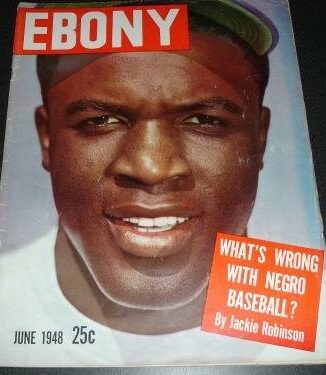 “Archbishop Tutu tells the story everywhere,” the late Ebony magazine editor Lerone Bennett Jr. said in 2005 on NPR’s “News and Notes” with Ed Gordon. “He was a little boy in Africa beaten down, oppressed, and he saw in the gutter one day a torn-up magazine. It happened to be the issue of Ebony with Jackie Robinson on the cover and he said he sat down and he read that and he looked at all the pictures of blacks in offices and in science, looked at black scientists. And he got up from there and he said, `They’ve been lying to me.’ And he said from that point on, he was a transformed individual.”
“Archbishop Tutu tells the story everywhere,” the late Ebony magazine editor Lerone Bennett Jr. said in 2005 on NPR’s “News and Notes” with Ed Gordon. “He was a little boy in Africa beaten down, oppressed, and he saw in the gutter one day a torn-up magazine. It happened to be the issue of Ebony with Jackie Robinson on the cover and he said he sat down and he read that and he looked at all the pictures of blacks in offices and in science, looked at black scientists. And he got up from there and he said, `They’ve been lying to me.’ And he said from that point on, he was a transformed individual.”
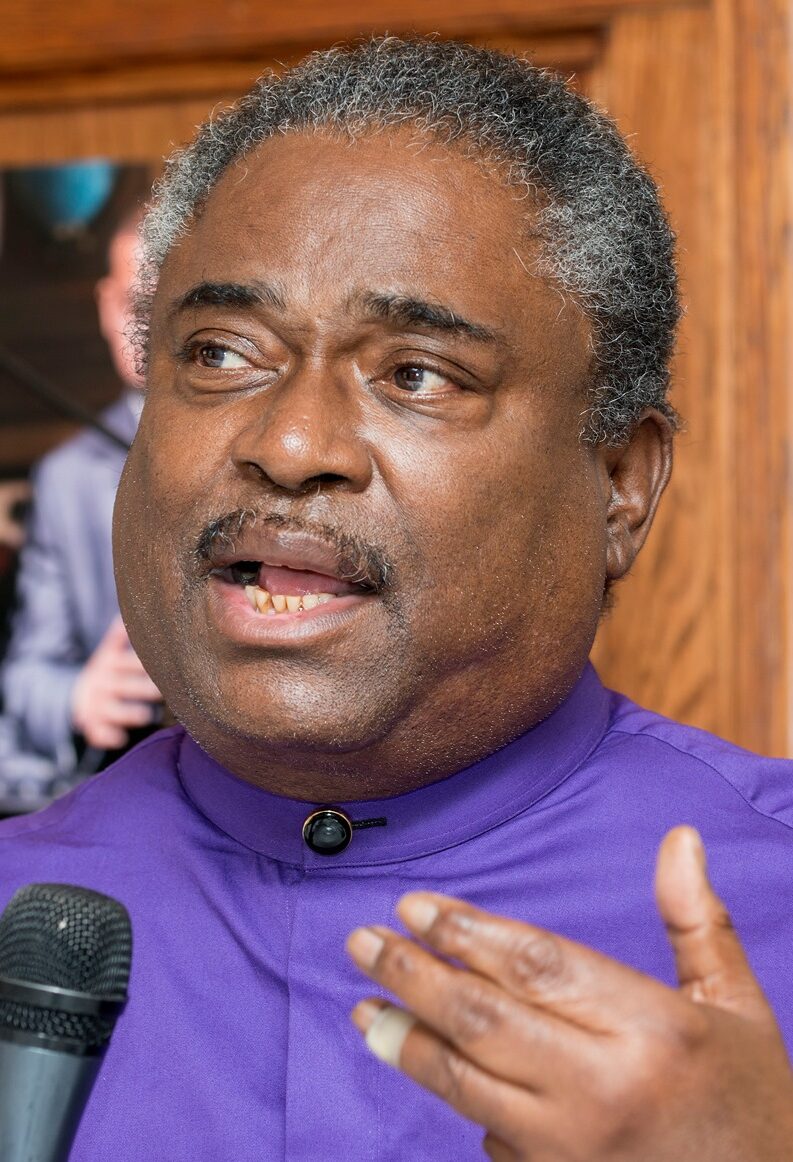 Retired African American journalist Kenneth Walker (pictured, by Bonita Bing), who reported from South Africa, told Journal-isms, “Archbishop Tutu’s fervent Christian faith compelled him to minister to a people being terrorized by a white supremacist government. Leadership was almost forced upon him as he chose to stand in the gap. . . . When virtually all other Black leaders were either killed, jailed, or banned, Christian ministers remained the only leaders with public voices. Bishop Tutu seized that opportunity to become a national and international spokesman for the anti-apartheid struggle.”
Retired African American journalist Kenneth Walker (pictured, by Bonita Bing), who reported from South Africa, told Journal-isms, “Archbishop Tutu’s fervent Christian faith compelled him to minister to a people being terrorized by a white supremacist government. Leadership was almost forced upon him as he chose to stand in the gap. . . . When virtually all other Black leaders were either killed, jailed, or banned, Christian ministers remained the only leaders with public voices. Bishop Tutu seized that opportunity to become a national and international spokesman for the anti-apartheid struggle.”
Walker also messaged that the Anglican archbishop “was always open and available to journalists. This role became increasingly international as Black South African journalists and newspapers were often banned or closed. He was always gentle and soft spoken, often using humor. I recall during one of my earliest interviews with him in Soweto, Tutu would recall how government officials often tried to pressure him to tone down the explosive funerals. “I told them, ‘if you stop killing people, there will be no funerals.’ “
For Tutu, the struggle extended to the United States, where he joined the protests against the imprisonment of activist journalist Mumia Abu-Jamal, convicted of killing Philadelphia police officer Daniel Faulkner in 1981. Abu-Jamal remains in prison, recovering from congestive heart failure. His supporters assert that he is a victim of civil rights violations.
“Tutu’s advocacy ranged widely, beginning with appeals for sanctions against apartheid and continuing with campaigns against homophobia, for gender equality, against child marriage, against the occupation of the West Bank and Gaza, against oppression in nations from China and Burma to Panama, and in support of the ‘second wave’ of liberation which saw the growth of multi-party democracy across Africa from 1989,” wrote John Allen, former managing editor of allAfrica.com. Allen covered Tutu as a journalist for 45 years, was his press secretary for 13 of them, and is the author of a definitive Tutu biography.
In South Africa’s Daily Maverick, Mamphela Ramphele recalled Sunday that Tutu’s anti-apartheid work in the 1980s stung Western leaders and the white South African press.
“His work for global divestment from South Africa, boycott and sanctions saw him playing an increasingly international role. He became a considerable thorn in the flesh of Western leaders such as Ronald Reagan, Margaret Thatcher and Helmut Kohl, criticising their lack of integrity for retaining links with the apartheid government.
“Only racists would support racist policies, he said.
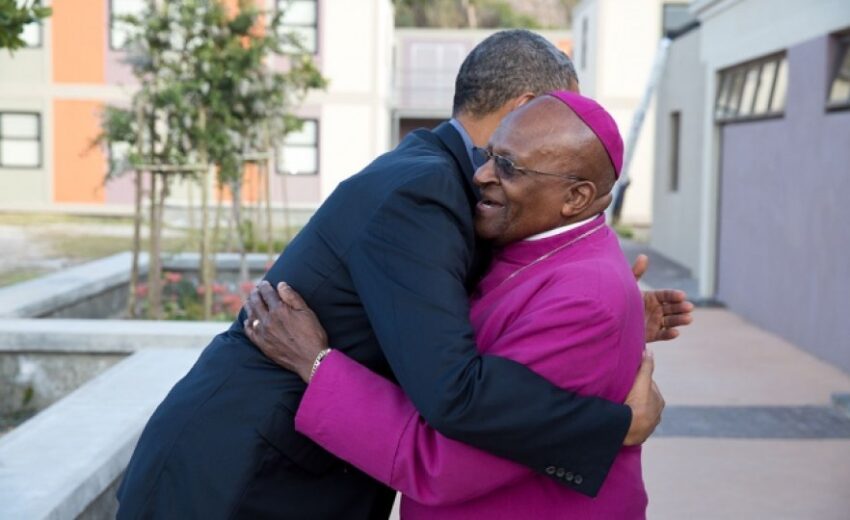
“Years later, the long-serving apartheid Minister of Foreign Affairs, Pik Botha, described the futility of trying to shut him up. The Arch would give a stinging interview to the BBC, for example, to which the South African government would respond by despatching Botha to the UK to go and speak to the BBC – ‘to do damage control,’ Botha said.
“He did his best, but there was only so much you could say, Botha smiled…
“The Arch had became an object of hatred in much of white South African society’s eyes, and the media portrayed him as a terrorist.
“He responded with customary humour, and by doubling down on his work. Tactically, he used humour to convey serious messages, though not everyone found him funny. . . .”
After independence, Tutu did not remain silent when press freedoms were at stake. In 2011, he joined opponents to a “secrecy bill” that opponents said would criminalize whistle-blowing and stifle investigative journalism.
Eventually President Jacob Zuma refused to sign the Protection of State Information Bill, which would make possessing or publishing anything the government deems “classified” an offense punishable by up to 25 years in prison. “The Arch,” as Tutu was known, called the bill “insulting.”
In the Chicago Tribune interview, the editors asked Tutu a question that could just as well be posed today.
“How do we fix this problem that half the country doesn’t recognize and the other half is so bitter about?”
Tutu replied, “You guys [need to] sit down and have a process, something like the Truth and Reconciliation Commission, where people will have the opportunity of telling their story.
“[There is a] pain in the tummy of every African-American that has not been articulated. And if you were to have a forum recognized by the nation, accepted by the nation, endorsed by the nation, people could come and tell their stories and tell it without fear.
“You really are a great country, and you owe it to yourselves to exorcise this demon. You owe it to your own children.”
U.S. journalist Ellis Cose, who interviewed Tutu in the 1990s for Newsweek, pointed out to Journal-isms what some would call another parallel between the two countries. That was “his observation that he rarely met a white person in South Africa who admitted to knowing how awful Blacks were treated under apartheid. To them, it was all a shock, which he apparently took as a sign of willful ignorance.”
- Marilyn Berger, New York Times: Desmond Tutu, Whose Voice Helped Slay Apartheid, Dies at 90
- Daily Maverick team, South Africa: So long Arch, thanks for the love
- Daily Maverick: The Arch’s life in Zapiro’s cartoons
- Miles Davis, YouTube: Tutu (musical composition)
- Patricia de Lille, iol.co.za: The ‘opstoker’ apartheid couldn’t contain, Patricia de Lille remembers Archbishop Desmond Tutu
- Bob Geldof, the Guardian: Desmond Tutu taught us all the true meaning of greatness
- The Guardian: Archbishop Desmond Tutu: a life in pictures
- Sumaya Hisham, Reuters: WITNESS — What I learned photographing the late Archbishop Desmond Tutu
- Sue Lawley with Archbishop Desmond Tutu, BBC: Archbishop Desmond Tutu (Nov. 6, 1994) (audio)
- Michele Norris, Twitter: A Desmond Tutu story
- Ofeibea Quist-Arcton, NPR: Desmond Tutu, an icon who helped end apartheid in South Africa, dies at 90
- Keith Reed, The Root: RIP Archbishop Desmond Tutu
- South African Government News Agency: International community reacts to Archbishop Tutu’s passing
Star Tribune Approves of Guilty Verdict
Dec. 23, 2021
No ‘Miscarriage of Justice’ in Ex-Officer’s Trial
Homepage photo: Minnesota Spokesman-Recorder/MGN
Support Journal-ismsNBC News covers the verdict. (Credit: YouTube)
No ‘Miscarriage of Justice’ in Ex-Officer’s Trial
“Former Police Officer Kimberly Potter’s conviction on two counts of manslaughter in the death of Daunte Wright will strike some people as a miscarriage of justice. It is not,” the Star Tribune, the Twin Cities’ largest newspaper, editorialized Thursday within minutes of the verdict. “The jurors who deliberated 28 hours to decide Potter’s guilt deserve respect, for this was a difficult, perplexing case.”
The editorial, notable for its swiftness and lack of equivocation, went beyond the expressions of sorrow and appeals for calm that mark many such editorials.
“An editorial writer was prepared for any outcome, and yes some of it was written and then quickly revised/updated to reflect the verdict,” editorial page editor Scott Gillespie messaged Journal-isms.
On Fox News, surprisingly, contributor Jonathan Turley did not dispute the verdict, instead saying that perhaps the law should be changed.
“Many predicted that the largely white jury would deliver racial injustice,” Turley wrote. “As with the jury in the murder trial of Ahmaud Arbery, these jurors showed again that they exhibit the objectivity and integrity too often missing in our commentators and politicians. The question is not whether the jury got the law right but whether the law itself is wrong in its vague criteria.”
The National Bar Association, however, said the case demonstrated the need for implicit bias training. The organization of African American lawyers said, “American law enforcement must see change in the form of implicit bias training, more thorough background checks, and ongoing sensitivity training to ensure that police officers are trained to see the same value in the lives of everyone they encounter.
“Too many innocent Black lives have been stolen with their assailants citing unfounded fear as the reason for taking their lives. Merely seeing Black people cannot be held an acceptable reason to fear for one’s life and to use deadly force.
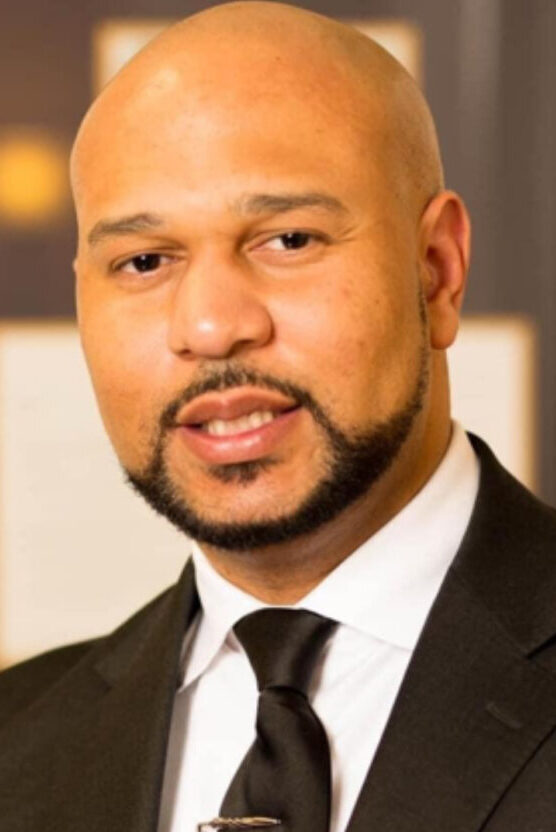 “ ‘It’s sad that the Black community has to wait with [bated] breath to see if a jury will see the value in a Black life. However, today’s verdict is a sigh of relief that sometimes our justice system does get it right. Duante’s life was taken unnecessarily and my heart goes out to his family. I am comforted in knowing that Potter is being held accountable for [her] actions,” NBA President Carlos Moore (pictured) said in a statement.
“ ‘It’s sad that the Black community has to wait with [bated] breath to see if a jury will see the value in a Black life. However, today’s verdict is a sigh of relief that sometimes our justice system does get it right. Duante’s life was taken unnecessarily and my heart goes out to his family. I am comforted in knowing that Potter is being held accountable for [her] actions,” NBA President Carlos Moore (pictured) said in a statement.
WCCO-TV Minneapolis offers legal analysis. (Credit: YouTube)
The Star Tribune editorial continued: “From their opposing corners, attorneys for the state and the defense accused each other of trying to send the jury down rabbit holes of misdirection. The image was apt but simplistic, because the rabbit holes — which were numerous — seemed to double back on themselves. They led to questions more readily than to conclusions.
“Were Potter’s proficiency and years of service indicators of a responsible police officer, or markers of her drift toward negligence? The jury was left to sort out a circular argument: Potter obviously didn’t mean to shoot Wright; she had mistaken her gun for her Taser; she had been trained, annually, not to make that very mistake; she went ahead and made it anyway — in effect, according to prosecutors, she chose to do the thing she didn’t mean to do.
” ‘She chose to draw the weapon on the right side of her duty belt,’ said prosecutor Erin Eldridge, referring to the Glock pistol that the former Brooklyn Center officer had worn there. ‘She chose to disregard her training and to disregard the cautions and the warnings and the risks.’
“Jurors heard testimony about the proper care and use of a Taser, as if a Taser had been used improperly, rather than not at all.
“At times it seemed there were two different Potters on trial — the theoretical Potter and the actual one. The actual Potter fired a gun at the driver of a car whose engine was running, creating the hazard of an uncontrolled vehicle. The theoretical Potter had meant only to stun the driver, not wound or kill him.
“Prosecutors pointed out that using a Taser in that situation would have created the same hazard, and that was a fair point. But it was a confusing one, because Potter wasn’t on trial for what she intended to do.
“The defense argued that Potter would have been justified in using the deadly force she had nevertheless decided not to use. The argument put the defense in the precarious position of arguing that Potter’s judgment didn’t matter — that what she did by mistake wouldn’t have been a problem if she had done it on purpose.
” ‘Everybody makes mistakes,’ defense attorney Earl Gray argued. ‘A mistake is not a crime.’ A mistake is also not a defense, replied the prosecutors. And sometimes, under certain conditions, a mistake does become a crime.
“The danger of ‘weapon confusion,’ as such mistakes are known, was another two-way rabbit hole. Others have made the same error. Did that suggest it was an easy mistake to make? Or did the known risk of weapon confusion compound the gravity of making it?
“A professor emeritus of law pointed out in a letter in Monday’s Star Tribune that the simple expedient of a Taser design change could help reduce the likelihood of such accidents. ‘Why not make it in the shape of a baseball?’ asked Joseph L. Daly, who taught at Mitchell Hamline School of Law. ‘Or something other than a gun?’ Why, indeed?
” ‘Jurors had a chance to inspect Potter’s Taser and gun, and to note the differences in weight, feel and color. The differences are considerable — yellow Taser instead of black Glock, less than 1 pound compared with more than 2. Even so, it’s not hard to imagine that Potter’s mind was more focused on the perceived danger in front of her than on the danger in her hand.’ “
Black News Channel spokesperson Tim Buckman added Friday, “BNC Correspondent Anser Hassan was assigned to cover the trial on site and has been on the ground in Minnesota since Potter took the stand last week.
“Yesterday’s live coverage ran commercial free and uninterrupted from the moment the verdict was announced. Multiple legal experts and social justice thought leaders contributed to BNC’s wide-ranging analysis in the hours that followed, including a segment with MN District Attorney Keith Ellison.”
On MSNBC’s “All In” with Chris Hayes (video), civil rights lawyer David Henderson predicted, “Kim Potter is a pawn in a game that’s going to play out in the next few years. There are similar trials like this that are going to take place.
“The officers who killed Atatiana Jefferson [in Fort Worth, Texas], Rayshard Brooks [in Atlanta] and Elijah McClain [in Aurora, Colo.] are all going to have trials. And if you look at the way the defense approached this trial, I think they were auditioning to take a role in those future trials.”
- BLK Press/SPEAK MPLS: Kim Potter Trial: Breaking News: The Verdict Is In (video) (Facebook)
- Kyndell Harkness, Star Tribune, Minneapolis: How the Star Tribune continues to re-examine itself following murder of George Floyd (Dec. 11)
- Charlayne Hunter-Gault, New Yorker: Remembering Desmond Tutu’s Hope (added Dec. 27)
- Joshua Lott and Holly Bailey, Washington Post: An Empty Seat at the Table: Daunte Wright’s Family Struggles With the Pain of Losing a Son and Brother (photographs)
- Minnesota Spokesman-Recorder: Kim Potter found guilty of manslaughter charges in the shooting death of Daunte Wright
- Henry Pan, Minnesota Spokesman-Recorder: Family, supporters celebrate Kim Potter guilty verdict
Ga. Man Freed, and Media Glare Played a Role
Dec. 23, 2021
Devonia Inman Spent 23 Years Behind Bars
Stephen A. Smith Tests Positive for COVID
Homepage photo: Devonia Inman and his family. “I’m glad I get to finally go home.” (Credit: WGCL-TV, Atlanta)
Support Journal-isms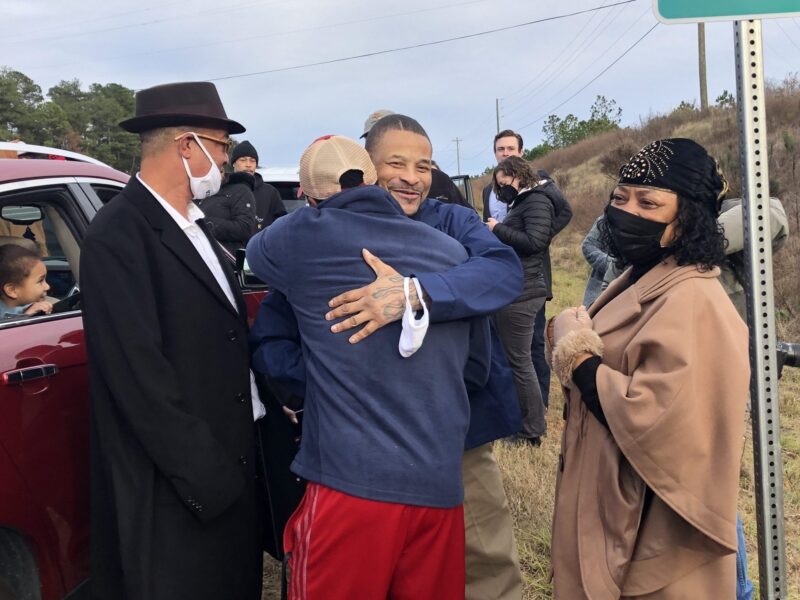
Devonia Inman Spent 23 Years Behind Bars
Devonia Inman, a 43-year-old Georgia man whose wrongful conviction led him to spend more than 23 years behind bars, walked out of prison Monday a free man — and three media organizations are given a share of the credit.
“I spent 23 years behind bars for something I didn’t do,” Inman said, according to his legal team, which worked pro bono. “It took a really long time to fix, even though it was so clear I wasn’t guilty. I’m glad I get to finally go home, and I’m grateful to everyone who helped make that possible.”
As Bill Rankin reported Monday for the Atlanta Journal-Constitution, Inman was sentenced to life in prison without the possibility of parole for the 1998 murder of Donna Brown, a Taco Bell night manager in Adel, Ga. She was killed in the restaurant’s parking lot and robbed of about $1,700 of the day’s receipts.
“It really was such a massive team effort that spanned years to free Devonia,” Blis Savidge, communications manager for the Georgia Innocence Project, messaged Journal-isms on Wednesday.
“In order for our criminal legal system to work how it is supposed to, it is critical that we have accountability. Sometimes it is easy for these cases of injustice to get lost; out of sight, out of mind. By using their skills and platforms to really get into all the details and retell Devonia’s extraordinary story, the AJC, Intercept and Sundance TV all helped to reinvigorate interest in the case and mount public pressure to ultimately attain justice for Devonia.
The Atlanta Journal-Constitution and The Intercept (pictured) produced in-depth podcasts about the case. Sundance TV featured it in the premiere episode of “It Couldn’t Happen Here“ (trailer).
 Savidge continued, “Now that Devonia is exonerated, they have also been using their platform to aid Devonias as he begins to rebuild his life by sharing his personal fundraiser. Just this morning Devonia’s personal fundraiser passed its initial goal of $7,000. As you may know, GA still does not have a state compensation law on the books so these funds will be critical to helping Devonia restart his life.”
Savidge continued, “Now that Devonia is exonerated, they have also been using their platform to aid Devonias as he begins to rebuild his life by sharing his personal fundraiser. Just this morning Devonia’s personal fundraiser passed its initial goal of $7,000. As you may know, GA still does not have a state compensation law on the books so these funds will be critical to helping Devonia restart his life.”
Rankin wrote for the Journal-Constitution, “Inman’s case, chronicled in 2017 during Season 4 of The Atlanta Journal-Constitution’s ‘Breakdown’ podcast, is extraordinary. He was convicted with no physical evidence tying him to the crime and largely due to the testimony of four key witnesses, three of whom later recanted what they said at trial.
“At trial, the judge refused to let Inman’s lawyers present testimony of witnesses who would have said that another man, Hercules Brown, told them he had committed the murder. (Hercules Brown, who had worked at the Taco Bell, was not related to Donna Brown.)
“A decade after Inman’s conviction, the Georgia Innocence Project found inside the clerk’s office the makeshift mask that prosecutors said was worn by Brown’s killer. The GBI crime lab tested the mask for DNA and found a match: Hercules Brown.
“Inman’s lawyers then filed a motion for a new trial but, even with the new DNA evidence, a judge denied it. Inman’s lawyers appealed that decision but the Georgia Supreme Court declined to even hear it, allowing the murder conviction to stand. . . .”
The Georgia Innocence Project said, “With this nightmare finally behind him, Devonia plans to rejoin his family in California and begin the journey of readjusting and healing.”
Because Georgia is one of 13 states that does not currently have a statutory compensation law to provide financial relief for years lost to wrongful conviction, “exonerees like Devonia Inman are left on their own, with virtually no support from the State, to rebuild their lives.”
The project has set up a personal fundraiser as a way to help Inman and his family.
- Georgia Innocence Project: Devonia Inman Exonerated After 23 Years of Wrongful Imprisonment
Stephen A. Smith joins “First Take” remotely to disclose he has tested positive for COVID-19. (Video) (Credit: ESPN)
Stephen A. Smith Tests Positive for COVID
“Stephen A. Smith has tested positive for COVID-19, the ESPN personality announced Tuesday on ‘First Take,’ ” Jenna Lemoncelli reported Tuesday for the New York Post.
“Smith, 54, appeared virtually on the show and said his positive test result was the reason he missed Monday’s episode.
“The longtime broadcaster said he is experiencing mild symptoms and had a fever over the weekend.
“Smith noted that he has gotten two Pfizer vaccine shots, but has not yet received a booster.
“He also clarified that his Thursday and Friday absences on ‘First Take’ were because he had an endoscopy Thursday morning, though he said he had a fever Thursday evening.
“The outspoken host said he discovered he was COVID-positive on Saturday, after filming ‘First Take’ in Los Angeles.
“Smith, whose voice sounded slightly raspy, said he is off the rest of the week for the Christmas holiday, and will be back in studio in the New Year. . . .”
An ESPN spokesperson told Journal-isms Wednesday that Smith’s statements stand on their own.
- Derek Hawkins and Lindsey Bever, Washington Post: With omicron, many vaccinated Americans will at some point test positive. Here’s what to do.
Lemon Is ‘Tired of Looking Over My Shoulder’
Dec. 21, 2021
Trumper Gets 3 Years for Harassing Journalists
Bernstein, Too, Urges More Voting Rights Coverage
Carlos Tejada Dies, an Asia Editor at N.Y. Times
Drive for Clemency Underway, 104 Years Later
Short Takes: Essence’s sexiest men; Build Back Better and local journalism; fact-checking racial myths about street gangs; “This Week in White Journalism”; questions to ask in stories about disability; Black banks; Michael Baldwin; Dax Tejera; Nikita Stewart; Bina Venkataraman; NBCU Academy embeds; “community engagement experts”;
June Cross; Sewell Chan; Alberto Orso; Jayson Blair; television’s need for more Hispanics; Alex Mena; Jenice Armstrong and Helen Ubiñas; winners of the Richard S. Holden Diversity Fellowship, Britain’s Sky and Black businesses; Europe’s podcasts on race; Israeli attack on AP photographer; freed Cameroon editor.
Support Journal-ismsIn 2017, Don Lemon read an open letter to then-President Trump after Trump angered the pregnant widow of U.S. Army Sgt. La David Johnson, who was among four U.S. service members killed in Niger. Myeshia Johnson was upset because she says Trump struggled to “remember my husband’s name.” Lemon told Trump, “Act like you know where the high road is.” (Credit: YouTube)
Trumper Gets 3 Years for Harassing Journalists
“A supporter of former President Donald Trump was sentenced to three years in prison Monday in a hearing that featured emotional remarks by CNN anchors Don Lemon and Brian Stelter about the fear caused by the rabid right-winger’s messages,” Noah Goldberg reported Monday for the Daily News in New York.
“ ‘ I am tired of looking over my shoulder. I am tired of being suspicious of even friendly faces in public,’ Lemon said in an emotional statement read in court. ‘I am tired of being called fake news … I am tired of being called names like “f—-t” and “n—-r” in public by people like Robert Lemke.
“ ‘I am exhausted. We are exhausted and tired,’ Lemon said.
“ ‘It is insulting to me that Robert Lemke thinks that he is a victim. … “Trump made me do it. The media made me do it,”’ Lemon said. ‘He’s a grown man!’ ”
Goldberg reported, “Robert Lemke, 36, sent threats to more than 50 prominent journalists, politicians and their family members in the aftermath of Trump’s 2020 election defeat. Before Manhattan Federal Judge Alvin Hellerstein imposed sentence, he heard from some of Lemke’s victims. Lemon recalled receiving menacing messages targeting him and his fiancé.”
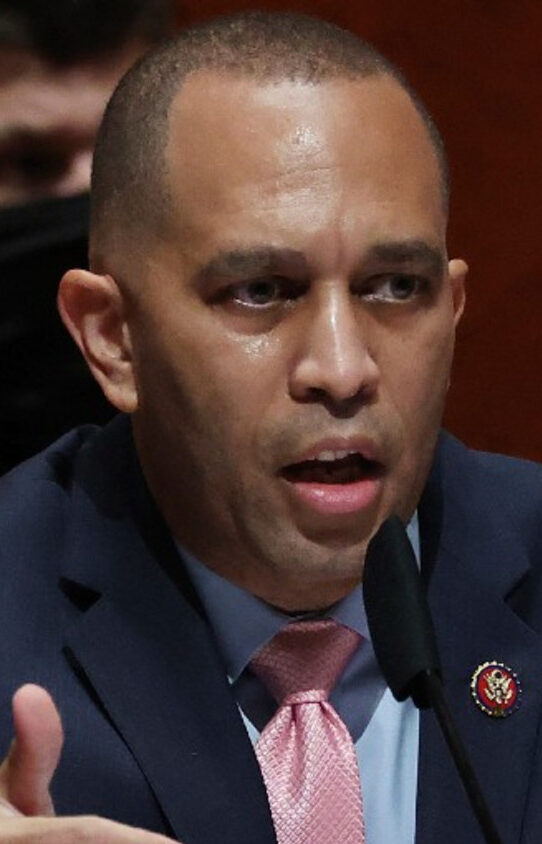 Goldberg also wrote, “Lemke’s victims also included relatives of Rep. Hakeem Jeffries (D-N.Y.) (pictured) and ABC News anchor George Stephanopoulos. He also threatened Sen. Tammy Duckworth (D-Ill.), the mayor of a major American city and the CEO of a nonprofit, said prosecutors. . . .”
Goldberg also wrote, “Lemke’s victims also included relatives of Rep. Hakeem Jeffries (D-N.Y.) (pictured) and ABC News anchor George Stephanopoulos. He also threatened Sen. Tammy Duckworth (D-Ill.), the mayor of a major American city and the CEO of a nonprofit, said prosecutors. . . .”
Marisa Sarnoff added for Law & Crime that Lemke sent a message to Jeffries’ brother “that included a picture of a home in the same neighborhood as the Congressman.
“Your brother is putting your entire family at risk with his lies and other words,” Lemke’s message said. ‘We are armed and nearby your house. You had better have a word with him. We are not far from his either. Already spoke to [the Congressman’s son] and know where his kids are.’
“’ ‘[Y]our words have consequences,’ Lemke also said in the message. ‘Stop telling lies; Biden did not win, he will not be president. We are not[] white supremacists. Most of us are active/retired law enforcement or military. You are putting your family at risk. We have armed members near your home. . . . Don’t risk their safety with your words and lies.’
Stelter wrote in his “Reliable Sources” newsletter, “Many reporters are sadly accustomed to receiving threats and harassment in connection with their work. For some, the intimidation can have a chilling effect. For others, it can become like brutal background noise, accepted as part of the job, even when the threats rise to the level of a felony.
“Prosecutions are rare. Consequences are rare. So maybe this case will matter. ‘The need to deter others from other similar conduct is evident,’ U.S. District Judge Alvin K. Hellerstein said before adjourning the hearing.”
Laura Coates sat in for Lemon Monday on “Don Lemon Tonight.”
- Brian Stelter, CNN: A man was sentenced to prison for threatening journalists. I was one of them
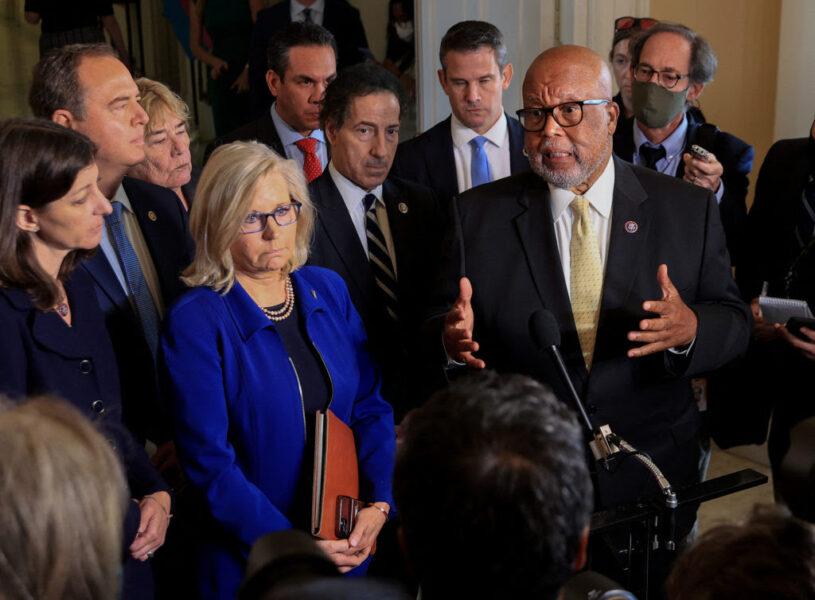
Bernstein, Too, Urges More Voting Rights Coverage
“I think that we need to start covering the most important story for us to cover,” Watergate journalist Carl Bernstein (pictured) said Sunday on CNN’s “Reliable Sources.” “Yes, we need to continue giving huge prominence to COVID and whatever breaking stories there are, but probably, as in World War Two, and as in the Civil War, the coverage has to be of the real war.
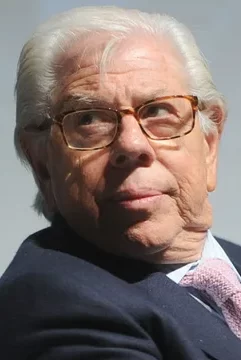 “And that could be four or five years as it was in World War Two and the Civil War. And that is the fight against Americans who want to vote [for] a party committed to keeping Americans from voting.”
“And that could be four or five years as it was in World War Two and the Civil War. And that is the fight against Americans who want to vote [for] a party committed to keeping Americans from voting.”
Bernstein isn’t alone. At Mother Jones, Monika Bauerlein wrote Dec. 13, “That’s the story deserves our attention — more than inflation or supply chain problems, more than Joe Manchin, right up there with the climate crisis and the fight for racial justice as the defining story of our time. It’s the story that journalists should be shouting from the rooftops and reporting out from every angle, every day, the same way we do a missing white Instagrammer.
“That this is not happening represents a terrifying failure of our profession. But it’s not an irreversible one. 2022 offers a chance to get our act together and cover democracy like it matters. Before we run out of time.”
It’s the same message that Barton Gellman delivered earlier in the month in promoting his cover story in The Atlantic, “Trump’s Next Coup Has Already Begun.”
“News media, frankly, could be putting a lot more attention on this,” Gellman said on NPR’s “Fresh Air.” “You’re getting some great reporting on the local election changes in places like ProPublica and The Washington Post. Nevertheless, they are not [the] sort of sustained war-footing news coverage that says democracy is under threat.”
Bernstein continued, “I covered the civil — the Voting Rights Act of 1965, when it — when it was passed. This party of seditious undermining of American democracy and our electoral system is trying to undo that Voting Rights Act, which guaranteed all Americans the right to vote.
“So this is the big story that we cannot lose sight of. We need to cover it like the war that it is, every day, every important battle.
Bernstein spoke on the day that Sen. Joe Manchin, D-W.Va., said on “Fox News Sunday” that he would not support the Build Back Better Act, a centerpiece of President Biden’s domestic policy proposals, imperiling the measure.
“And this also goes to the question of voting rights because unless there is something that can be done about the filibuster rule in the Senate, which Manchin again, has indicated he will not change, there is not going to be an effective legislative means of doing what needs to be done to guarantee American democracy through the right to vote for all Americans without being suppressed, as we’re seeing now.”
- Jamelle Bouie, New York Times: What Does ‘White Freedom’ Really Mean?
- Brennan Center for Justice: Voting Laws Roundup: December 2021: This year’s tidal wave of restrictive voting legislation will continue in 2022.
- Charleston (W.Va.) Gazette-Mail op-eds from Jack Bernard, Eric Engle and Hoppy Kercheval
- Editorial, News & Observer, Raleigh, N.C.: NC Republicans are becoming the party of bigots, insurrectionists and the cowardly who let it happen
- Renée Graham, Boston Globe: Running out the clock on democracy
- Theodoric Meyer, Washington Post: Democratic push on voting rights becomes more urgent as midterms approach (Dec. 22)
- Askia Muhammad, Washington Informer: GOP ‘Base’ Really Wants Armageddon, Chaos (Dec. 8)
- Eugene Robinson, Washington Post: Joe Manchin isn’t the only obstacle to Build Back Better
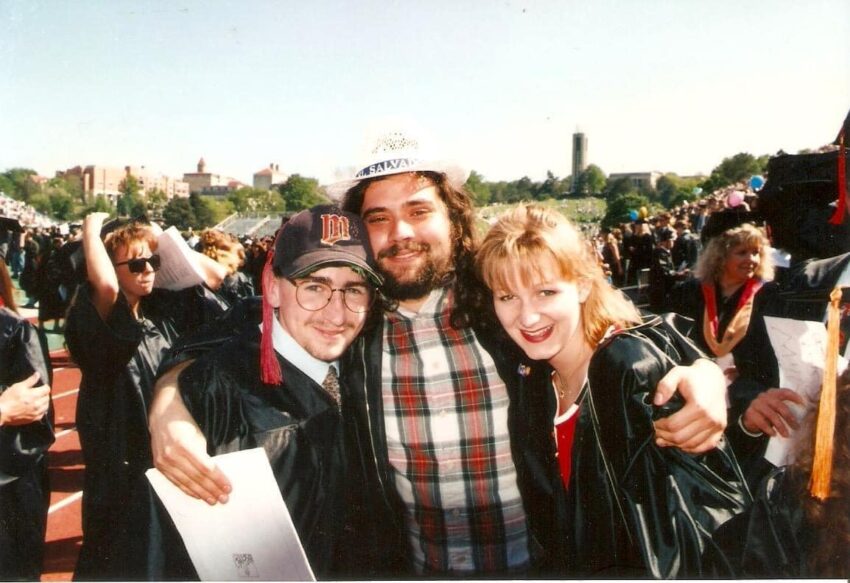
Carlos Tejada Dies, an Asia Editor at N.Y. Times
Carlos Tejada, deputy Asia editor at the New York Times and one of the highest-ranking Latinos in its newsroom, died Friday after a heart attack, his wife, Nora, announced on Twitter. He was 49.
“He was one of the best editors in our newsroom, an unending champion of reporters and a fierce advocate for our journalism,” Adrienne Carter, Asia editor at the Times, wrote colleagues. “He worked tirelessly behind the scenes, always making our stories better. You just knew when a piece had the Carlos touch.
“But it was his spirit and his humanity that made Carlos such a wonderful editor. He knew when we needed guidance, tough love, or just someone to listen. He was our friend, and we will miss him terribly. Our love goes out to his wife, Nora, and their two children.”
Marc Lacey, assistant managing editor, messaged Journal-isms, “”Carlos was a skilled editor of copy but he was much more than that. He developed reporters. He cared about them. He filled our Seoul newsroom with his laugh.”
A GoFundMe page to benefit his children had raised more than $148,000 from 408 donors by Tuesday evening.
The son of a Salvadoran and from southern Arizona, Tejada joined the Times in 2016 after 20 years at the Wall Street Journal, where he was China News editor and Hong Kong deputy bureau chief. He was a graduate of the University of Kansas, which he attended from 1991 to 1995.
- Richard Sandomir, New York Times: Carlos Tejada, Deputy Asia Editor for The Times, Dies at 49 (Dec. 22)
Drive for Clemency Underway, 104 Years Later
W.E.B. Du Bois and Ida B. Wells would approve.
“A group of attorneys and advocates have pledged to seek clemency for 110 Black soldiers who were convicted in a mutiny and riots at a military camp in Houston in 1917,” the Associated Press reported Monday. It was the nation’s largest court-martial.
“The South Texas College of Law Houston and the NAACP’s local branch have signed an agreement to continue fighting for clemency for the soldiers of the all-Black Third Battalion of the U.S. Army’s 24th Infantry Regiment,” the Houston Chronicle reported.
“They plan to ask the Secretary of the Army to posthumously grant honorable discharges and urge the Army Board for Correction of Military Records to recommend pardons to President Joe Biden.
“The soldiers were either executed or given long prison sentences.
“ ‘We are on a quest to obtain justice for the 24th Infantry Regiment … that organized group of men who died with shameful reputations at the hands of those who had the power of the government, the courts and the power of the media,’ said Bishop James Dixon, board president of the NAACP Houston Branch. . . .”
As recalled in this space, “a soldier from the black 24th United States Infantry, 3rd Battalion, was beaten and incarcerated for coming to the aid of a black woman in Houston who was being abused by two policemen.
“When word reached the battalion, a false rumor spread that the soldier had been killed. About 100 black soldiers went to police headquarters in San Felipe, Texas, only to be met by a mob of a thousand whites. White and black civilians and soldiers were killed.
“In the predawn hours of Dec. 11, 1917, the Army hanged 13 of the 63 soldiers who had been charged with disobedience, mutiny, assault and murder. In a second court-martial, 11 more were given a death sentence.
“Wells and W.E.B. Du Bois, editor of the NAACP’s the Crisis, each condemned what they considered a double standard and the inability of the soldiers to appeal.
“Wells earned a visit from intelligence officers when she had buttons made up that memorialized the men of the 24th. One threatened to arrest her on a charge of treason if she continued to distribute them. Wells said it would be an ‘honor’ to go to prison under such circumstances,” Paula J. Giddings wrote in her 2008 biography of Wells, “Ida: A Sword Among Lions.”
Short Takes

- “Da’Vinchi, the Haitian-American heartthrob who came to fame as Cash Mooney on Grown-ish and has since become eye candy for women of all ages as Terry ‘Southwest T’ Flenory on [50 Cent’s Starz series] BMF,” tops Essence magazine’s list of sexiest men. “Representing the Grown and Sexy contingent was legendary lip-licker LL Cool J and our forever unproblematic fave, Method Man,“ Keyaira Boone wrote Tuesday.
- “The Build Back Better bill, as passed in the House, contained a provision that would create a tax credit to support local news organizations, some of which stand to benefit to the tune of millions of dollars should the provision become law,” Jon Allsop wrote Tuesday for Columbia Journalism Review. “As Marc Tracy, a media reporter at the New York Times, pointed out yesterday, the future of the tax credit is now uncertain. Poynter’s Rick Edmonds reported last week (before [Sen. Joe] Manchin’s Fox interview) that proponents of the measure recently met with Manchin’s staff, who assured them that he ‘strongly supports’ helping local news. Whether that translates into legislative action, of course, remains to be seen. . . .”
- “Hollywood exerts a powerful influence on how people perceive gangs, and, according to a 2016 Vox article, 62 percent of the actors portraying gang members are Black, despite the fact that less than 40 percent of real-life gangsters are,” Chandra Bozelko wrote Friday for The Washington Post. “Even the 2005 Encyclopedia of African American Society says, ‘Reflecting a changing inner-city population, most gang members are minorities.’ While they are not a majority, the largest racial group among gang members is White; about 40 percent of gang members are non-Latino White, with the remainder divided among Black and Latino and other minorities, according to a report in the Guardian citing Babe Howell, a criminal law professor at the City University of New York. . . .”
- “White journalism centers whiteness above all else and treats the rest of us as ethnic condiments,” said Wajahat Ali, who is Pakistani, appearing with Julio Ricardo Varela, who is Puerto Rican, in “This Week in White Journalism.” The video is part of the Latino Rebels Late Night project. This latest episode takes off from the new film about the making of the Beatles’ “Get Back.”
- “Here are three basic questions (beyond the disability style guide) to ask of every story to make disability visible in news,” Hannah Wise wrote Monday for the Reynolds Journalism Institute: “Where are the disabled voices? . . . Is ableism hiding in plain sight? . . . Is this the most accessible format for us to present this story?” “When The Washington Post published a lengthy project about unpaid caregivers in America . . . Critics pointed out that the disabled spouses were rarely quoted in the piece. Reporting focused on choices and losses the women faced in order to care for their disabled partners, which only perpetuated the incorrect stereotype that disabled people are a burden. . . .”
- “Regulators have failed to carry out a federal mandate to ‘preserve and promote’ Black-owned banks, a ProPublica investigation has found,” Mick Dumke, Haru Coryne and Mariam Elba reported Tuesday for ProPublica. The headline asks, “What’s Gone Wrong at Chicago’s Last Black-Owned Bank?”
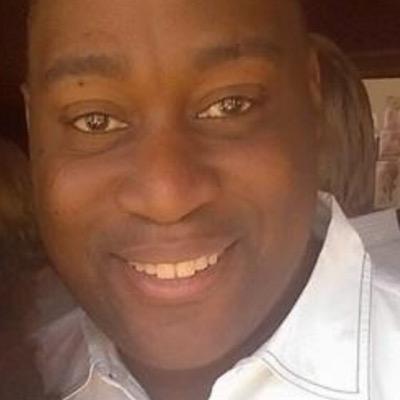 “Michael Baldwin (pictured) has been named news director of 13ABC ACTION NEWS,” WTVG-TV in Toledo, Ohio, announced. “Michael has done a great job for us since joining as A-ND [assistant news director] earlier this year. Prior to that Michael was the news director of our Gray-TV station WDTV in Clarksburg (WV). Before being promoted to news director there, he was FOX19’s (WXIX Cincy) SUPERSTAR reporter,” wrote Chris Fedele, WTVG vice president and general manager.
“Michael Baldwin (pictured) has been named news director of 13ABC ACTION NEWS,” WTVG-TV in Toledo, Ohio, announced. “Michael has done a great job for us since joining as A-ND [assistant news director] earlier this year. Prior to that Michael was the news director of our Gray-TV station WDTV in Clarksburg (WV). Before being promoted to news director there, he was FOX19’s (WXIX Cincy) SUPERSTAR reporter,” wrote Chris Fedele, WTVG vice president and general manager.
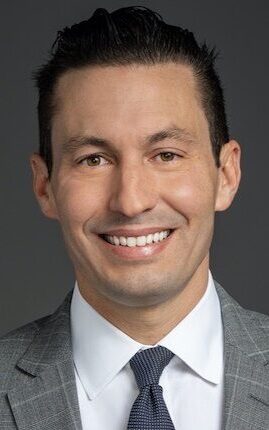 “Dax Tejera (pictured), who had been leading ‘This Week with George Stephanopoulos‘ since the beginning of the pandemic, has been named executive producer of the Sunday morning show,” Veronica Villafañe reported Monday for her Media Moves site, quoting ABC News President Kim Godwin.
“Dax Tejera (pictured), who had been leading ‘This Week with George Stephanopoulos‘ since the beginning of the pandemic, has been named executive producer of the Sunday morning show,” Veronica Villafañe reported Monday for her Media Moves site, quoting ABC News President Kim Godwin.
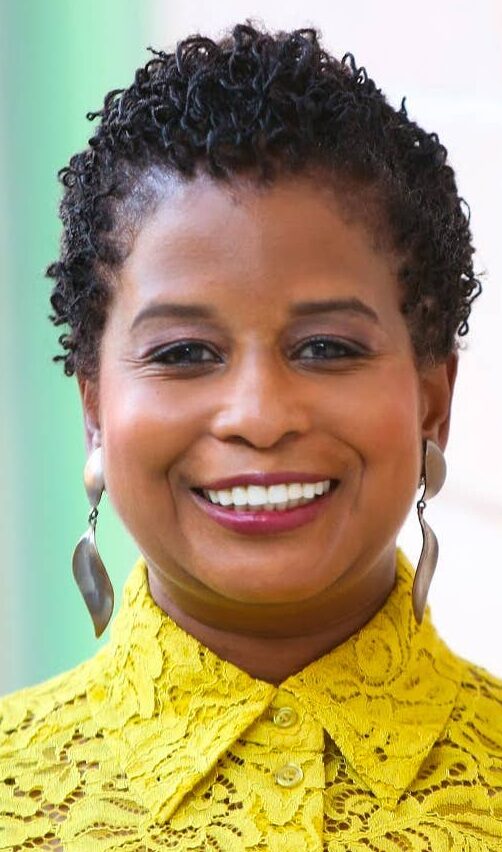 “Nikita Stewart (pictured), who joined The Times in 2014 as a reporter and who was promoted to assistant editor in Metro six years later, is moving into the Culture and Lifestyle department as our new Real Estate editor, Assistant Managing Editor Sam Sifton wrote the New York Times newsroom Thursday. “There she’ll help reinvent coverage of a subject that deeply captivates our audience and offers a real chance to see it grow. . . .”
“Nikita Stewart (pictured), who joined The Times in 2014 as a reporter and who was promoted to assistant editor in Metro six years later, is moving into the Culture and Lifestyle department as our new Real Estate editor, Assistant Managing Editor Sam Sifton wrote the New York Times newsroom Thursday. “There she’ll help reinvent coverage of a subject that deeply captivates our audience and offers a real chance to see it grow. . . .”
 “Some news: On January 21, I’ll be stepping down as editorial page editor of the @BostonGlobe,” Bina Venkataraman (pictured) tweeted Monday, “after 2+ years leading one of the best teams in journalism amid more history-making news cycles than I could have possibly imagined . . . I’ll stay on at the Globe as an Editor-at-Large, a role in which I’ll get to write, keep advising the amazing @the_emancipator team, and more. I’m also eager to start doing some deeper thinking off deadline and to chart what comes next.”
“Some news: On January 21, I’ll be stepping down as editorial page editor of the @BostonGlobe,” Bina Venkataraman (pictured) tweeted Monday, “after 2+ years leading one of the best teams in journalism amid more history-making news cycles than I could have possibly imagined . . . I’ll stay on at the Globe as an Editor-at-Large, a role in which I’ll get to write, keep advising the amazing @the_emancipator team, and more. I’m also eager to start doing some deeper thinking off deadline and to chart what comes next.”
- “The American Press Institute announced that five community engagement experts will support news organizations in its Listening & Sustainability Lab in partnership with the Racial Equity in Journalism Fund at Borealis Philanthropy. “Each ‘listening adviser’ supports one of five publishers of color in the program in a roughly 12-week ‘sprint’ to develop two-way conversation with a segment of their community that the publishers want to better serve — e.g. Black business owners in Atlanta. . . .”
- NBC News and CNBC Tuesday announced their first cohort of embeds from their NBCU Academy, a two-year program that pairs recent graduates from the Academy’s partner schools with NBC News Digital’s diversity verticals, NBC Asian America, NBCBLK, NBC Latino and NBC Out. There are also two new hires for CNBC, working for CNBC Make It and CNBC en Español. Chosen were Edwin Flores, Claretta Bellamy, Brahmjot Kaur, Jay Valle, Ashton Jackson and Jacqueline Mata. Absent are Native Americans, though the Native American Journalists Association announced a 2022 fellowship with NBC last week that “gives students real world experience and exposure to one of the world’s leading News divisions, which includes NBC News, MSNBC and CNBC.”
- “For our archival issue, June Cross explores the evolution of ‘objectivity’ over time. When Cross worked at PBS NewsHour, in the early eighties, she once complained to an editor about the show’s lack of Black and Latino guests,” Jon Allsop wrote for Columbia Journalism Review. “ ‘He fixed his gaze on me and explained that the NewsHour’s job was to enlighten the public about policy conversations that took place behind closed doors, where important decisions were made. Since minorities weren’t in those rooms, I recall him saying, they couldn’t appear on our air.’ “
- . . . in addition, “Sewell Chan reflects on the persistent struggles of the media industry. ‘What’s striking, when reading through the archives of the Columbia Journalism Review, is that this has always been a tough business,’ Chan writes. Journalists like to trade ‘nostalgic memories of “the good old days,” and yet the truth is that the old days weren’t all that good — or at least they weren’t very good for very many people.’ “
 “Alberto Orso (pictured) is taking over leadership of the second hour of Good Morning America as senior broadcast producer, effective immediately, Veronica Villafañe wrote Thursday for her Media Moves site. She also wrote, “Orso has led GMA’s coverage of the Oscars for almost a decade and worked extensively on breaking news for the morning show. . . .”
“Alberto Orso (pictured) is taking over leadership of the second hour of Good Morning America as senior broadcast producer, effective immediately, Veronica Villafañe wrote Thursday for her Media Moves site. She also wrote, “Orso has led GMA’s coverage of the Oscars for almost a decade and worked extensively on breaking news for the morning show. . . .”
- Eighteen years after Jayson Blair was caught plagiarizing and fabricating his way through stories he wrote for The New York Times, Blair, 45, said at a forum Friday that “If I had to go back through it all over again, to learn the lessons that I did, I would do it.” At the Zoom forum, sponsored by the Society of Professional Journalists’ New England chapter, Blair insisted he didn’t mean he would repeat “the actions,” a reference to his plagiarism and fabrications, but that “it was a humbling process, and it gave me an opportunity to see a lot of my own weaknesses and failings,” Maysoon Khan reported Tuesday for SPJ. (video)
- “All of the news networks have vowed to make their public-facing talent more representative of the country,” Javier Palomarez, president and CEO of the United States Hispanic Business Council, wrote Monday for the Miami Herald. “There have been some strides, especially at NBC under the leadership of Cesar Conde, the first and only Hispanic to be chairman of NBCUniversal News Group. NBC has more Hispanic anchors than any other English-language news organization. Jose Diaz-Balart, Alicia Menendez, Carl Quintanilla and Tom Llamas are some of the network’s on-air talent.” Palomarez concluded, “It’s time for ABC, CBS and other media outlets to follow suit and include Hispanics in prominent positions both in front of and behind the camera. Hispanics are tired of being overlooked.”
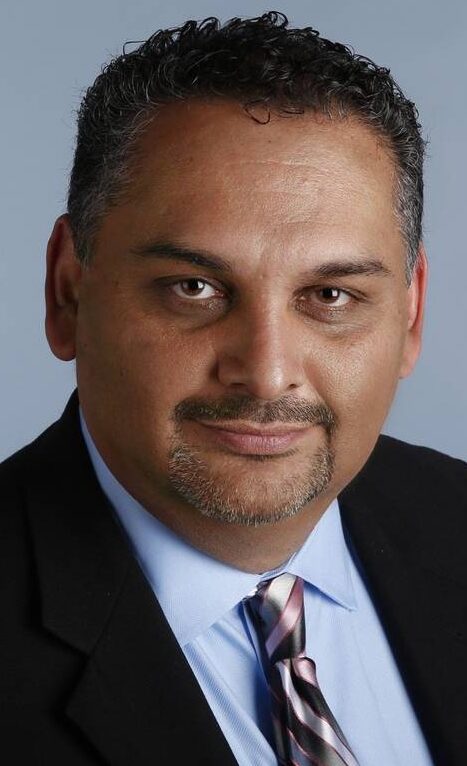 Last month, Miami Herald Executive Editor Monica Richardson announced the promotion of Alex Mena (pictured) to managing editor, the Herald reported Monday. “Mena, who has been with the Herald for more than 26 years, will help oversee Miami newsroom operations, with direct oversight over el Nuevo Herald.” Dana Banker, managing editor of the South Florida Sun Sentinel, will join the Herald in January as senior managing editor, succeeding Rick Hirsch, who retired. Bob McFarlin, who had been senior director of infrastructure and security for McClatchy, parent company of the Miami Herald and el Nuevo Herald, will expand his role and assume general manager duties for the two South Florida news organizations, and Tabassum “Toby” Zakaria becomes deputy managing editor for local news.
Last month, Miami Herald Executive Editor Monica Richardson announced the promotion of Alex Mena (pictured) to managing editor, the Herald reported Monday. “Mena, who has been with the Herald for more than 26 years, will help oversee Miami newsroom operations, with direct oversight over el Nuevo Herald.” Dana Banker, managing editor of the South Florida Sun Sentinel, will join the Herald in January as senior managing editor, succeeding Rick Hirsch, who retired. Bob McFarlin, who had been senior director of infrastructure and security for McClatchy, parent company of the Miami Herald and el Nuevo Herald, will expand his role and assume general manager duties for the two South Florida news organizations, and Tabassum “Toby” Zakaria becomes deputy managing editor for local news.
- “Starting soon, you’ll begin to find columns from two of the Inquirer’s most respected metro columnists, Jenice Armstrong and Helen Ubiñas, on our Opinion pages, the Philadelphia Inquirer announced. “By moving their work from the Region pages to Opinion, we hope to be more transparent to readers about what is news and what is opinion. This also allows Jenice and Helen to expand the scope of their journalism, collaborating with the Inquirer’s Editorial Board as it weighs in on the most important issues of the day. . . .”
- “Six talented mid-career editors have been selected as the second class of recipients of the Richard S. Holden Diversity Fellowship, a collaboration of ACES and the Dow Jones News Fund,” ACES: The society for editing, announced Friday. This year’s fellows are: Juliet M. Beverly, of Arlington, Va., senior editor with the Society for Neuroscience’s BrainFacts.org; Amarachukwu Chimeka of Lekki, Lagos, Nigeria, a book editor, publisher, and advocate for young readers; KaToya Ellis Fleming of Wilmington, N.C., editor of Lookout Books and an assistant professor of publishing at the University of North Carolina-Wilmington; Sydney Jarrard of Hudson, N.Y., who worked for eight years at the American Booksellers Association; Emily Shi Lee of Honolulu, an editor and content designer; and Seth McBride, of Portland, Ore., who copyedits all content for print and manages the website for New Mobility magazine, a publication of the United Spinal Association.
- “Comcast-backed pay-TV operator Sky is setting out to support more Black-owned and led businesses in the U.K. through a £1 million ($1.3 million) fund, with plans to grow diversity in Sky’s supply chain in the future,” Manori Ravindran reported Monday for Variety. “The initiative is targeted specifically at Black entrepreneurs and is in addition to the £30 million that was earmarked over three years in June 2020 to improve Black and minority ethnic representation at all levels within Sky and elsewhere. . . . .”
- In Europe, “podcasts have been popping up to fill the void of coverage of racism and race — and in some cases, starting the conversation around how to find the right words to discuss fraught topics in different languages. This piece will explore these themes through podcasts broadcasting in Italy, Germany, and France,” Stefania D’Ignoti reported Oct. 21 for Nieman Reports.
- “Press organizations condemned the Israeli paramilitary border police after officers beat Associated Press photographer Mahmoud Illean while he was covering a protest in Jerusalem Friday,” Lora Korpar reported for Newsweek. “Illean had been photographing a protest in the Sheikh Jarrah neighborhood of Jerusalem, where Palestinian residents demonstrate weekly against people trying to evict them from their homes. Illean said a group of officers threw stun grenades at him about 15 minutes after the demonstration ended. There is video evidence of the police punching him multiple times. . . .” Jerusalem Post
- “Emmanuel Mbombog Mbog Matip, a Cameroonian newspaper editor who was detained in a completely arbitrary manner for 16 months and had to spend a further week in prison after his acquittal, has finally been freed,” Reporters Without Borders said Tuesday, adding that it “welcomes his release but fears further proceedings against this journalist.”
To subscribe at no cost, please send an email to journal-isms+subscribe@groups.io and say who you are.
Facebook users: “Like” “Richard Prince’s Journal-isms” on Facebook.
Follow Richard Prince on Twitter @princeeditor
Richard Prince’s Journal-isms originates from Washington. It began in print before most of us knew what the internet was, and it would like to be referred to as a “column.” Any views expressed in the column are those of the person or organization quoted and not those of any other entity. Send tips, comments and concerns to Richard Prince at journal-isms+owner@
View previous columns (after Feb. 13, 2016).
View previous columns (before Feb. 13, 2016)
- Diversity’s Greatest Hits, 2018 (Jan. 4, 2019)
- Book Notes: Is Taking a Knee Really All That? (Dec. 20, 2018)
- Book Notes: Challenging ’45’ and Proudly Telling the Story (Dec. 18, 2018)
- Book Notes: Get Down With the Legends! (Dec. 11, 2018)
- Journalist Richard Prince w/Joe Madison (Sirius XM, April 18, 2018) (podcast)
- Richard Prince (journalist) (Wikipedia entry)
- February 2018 Podcast: Richard “Dick” Prince on the need for newsroom diversity (Gabriel Greschler, Student Press Law Center, Feb. 26, 2018)
- Diversity’s Greatest Hits, 2017 — Where Will They Take Us in the Year Ahead?
- Book Notes: Best Sellers, Uncovered Treasures, Overlooked History (Dec. 19, 2017)
- An advocate for diversity in the media is still pressing for representation, (Courtland Milloy, Washington Post, Nov. 28, 2017)
- Morgan Global Journalism Review: Journal-isms Journeys On (Aug. 31, 2017)
- Diversity’s Greatest Hits, 2016
- Book Notes: 16 Writers Dish About ‘Chelle,’ the First Lady
- Book Notes: From Coretta to Barack, and in Search of the Godfather
- Journal-isms’ Richard Prince Wants Your Ideas (FishbowlDC, Feb. 26, 2016)
- “JOURNAL-ISMS” IS LATEST TO BEAR BRUNT OF INDUSTRY’S ECONOMIC WOES (Feb. 19, 2016)
- Richard Prince with Charlayne Hunter-Gault, “PBS NewsHour,” “What stagnant diversity means for America’s newsrooms” (Dec. 15, 2015)
- Book Notes: Journalists Follow Their Passions
- Book Notes: Journalists Who Rocked Their World
- Book Notes: Hands Up! Read This!
- Book Notes: New Cosby Bio Looks Like a Best-Seller
- Journo-diversity advocate turns attention to Ezra Klein project (Erik Wemple, Washington Post, March 5, 2014)
When you shop @AmazonSmile, Amazon will make a donation to Journal-Isms Inc. https://t.co/OFkE3Gu0eK
— Richard Prince (@princeeditor) March 16, 2018

